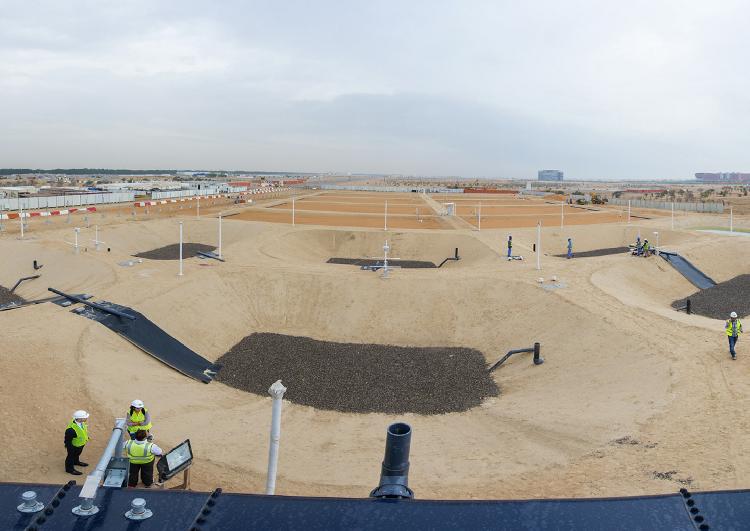
United Arab Emirates’ world-class research will produce food and fuel without using arable land or fresh water
The Sustainable Bioenergy Research Consortium (SBRC) today announced that in March it will begin operating the world’s first bioenergy research facility using desert land – irrigated by seawater – to produce both food and aviation fuels. The facility is located on a 2-hectare site at Masdar City, a low-carbon, low-waste sustainable urban development in Abu Dhabi.
“This game-changing research places Abu Dhabi at the center of a global movement to advance technologies to produce sustainable, commercially viable bioenergy,” said Dr. Behjat Al Yousuf, interim provost, Masdar Institute of Science and Technology. “Abu Dhabi’s commitment to advance breakthrough research that addresses water and food security – with tremendous growth potential – underpins the nation’s transformation into a knowledge-based economy.
“Considering that 97 percent of the world’s water is salt water and about 20 percent of the world’s land is desert, this approach turns a land and water resource scarcity problem on its head,” said Dr. Al Yousuf. “Already, this research is attracting significant interest from other water and arable land-constrained countries.”
The research facility is a platform to explore the commercial viability and scale-up potential of an integrated, sustainable bioenergy system that produces food and fuel, without using arable land or fresh water in a desert environment. Successful development of this technology could support global food security, mitigate carbon emissions and reduce water pollution from industrial fish and shrimp aquaculture operations.
Masdar Institute, together with Etihad Airways and The Boeing Company, founded the SBRC to advance the aviation industry’s commitment to reducing its carbon emissions by developing a clean, alternative fuel supply. TAKREER, Safran and GE have since joined the research group.
The UAE Ministry of Environment and Water also recently announced that it has signed an agreement with Masdar Institute to collaborate on conserving marine ecosystems and developing a healthy aquaculture in the UAE.
Her Excellency Mariam Mohammed Saeed Hareb, the assistant undersecretary of Water Resources and Nature Conservation Affairs with the Ministry of Environment and Water, said, “This project in particular is quite unique, and the Ministry is pleased to support it. It was designed as an integrated bioenergy system specifically to eliminate the major criticisms leveled against large-scale biofuel production – that it diverts agricultural production away from food crops, competes for scarce fresh water sources and uses land that could grow food.”
The recent decision by TAKREER, the refining company owned by the Abu Dhabi National Oil Company (ADNOC), to join the SBRC underscores the UAE’s unique ability to create a comprehensive biofuel supply chain – from research, production and refining, to final flight operations.
“As member of the SBRC we reiterate our support to the Seawater Energy and Agriculture System pilot project, said TAKREER CEO Jasem Ali Al-Sayegh. TAKREER Research Centre (TRC) will participate with other partners in the development of potential aviation biofuel feedstock to produce a sustainable aviation biofuel industry in the UAE. Biojet fuels will be complementary to our efforts to meet the ever growing demand for jet fuels in the country.”
“This pilot project is a great example of the public-private collaboration Etihad Airways sees as essential to stimulating innovation and driving real change within the transportation industry,” said James Hogan, president and CEO, Etihad Airways. “We expect this pilot project to demonstrate the commercial viability of an integrated, sustainable approach to producing food and fuel at a large scale. With the global second-generation biofuels market estimated to reach $23.9 billion by 2020, this project could deliver Abu Dhabi with a valuable export to further reinforce its burgeoning innovation economy.”
Studies have shown that sustainably produced aviation biofuel reduces carbon emissions by 50 to 80 percent through its lifecycle. In addition, research has shown that aviation biofuel performs as well as or better than traditional, petroleum-based jet fuel with higher energy content and a lower freeze point, among other critical metrics. More than 2,000 commercial flights have used sustainable aviation biofuel blended with conventional petroleum jet fuel since renewable jet fuel was approved for commercial use in 2011.
“Boeing’s commitment to partner with Masdar, Etihad, TAKREER and others to develop sustainable available biofuel in the UAE is part of our global effort to reduce aviation’s environmental impact,” said Bernard Dunn, president of Boeing Middle East, North Africa and Turkey. “Developing aviation biofuel in the UAE will increase our customers’ fuel choices and reduce our industry’s carbon emissions.”
The pilot project is based upon an integrated, closed-loop system. The technology uses coastal seawater to raise fish and shrimp for food, whose nutrient-rich wastewater then fertilizes plants rich in oils that can be harvested for aviation biofuel production. The plants thrive in arid, desert conditions and don’t require fresh water or arable land to grow. Lastly, the effluent is diverted into cultivated mangroves before being discharged back into the sea, further removing nutrients and providing valuable carbon storage.
The SBRC’s announcement was made during Abu Dhabi Sustainability Week (ADSW), the Middle East’s largest gathering of international leaders to address the interconnected challenges of energy and water security, climate risk and sustainable development. Hosted by Masdar, Abu Dhabi’s renewable energy company, ADSW includes the World Future Energy Summit, the International Water Summit, EcoWaste, Women in Sustainability, Environmental & Renewable Energy (WiSER) Initiative and the Zayed Future Energy Prize.


























